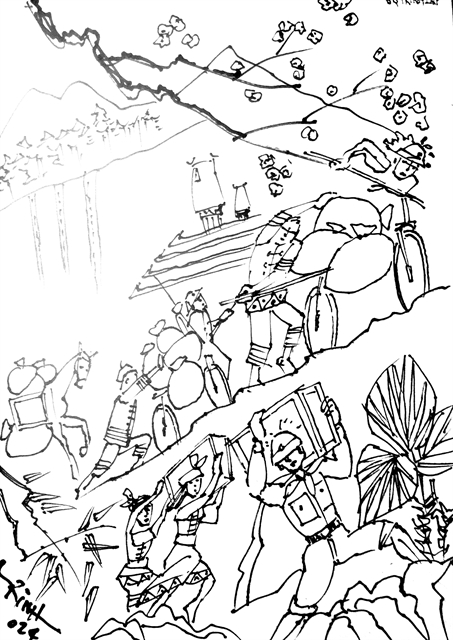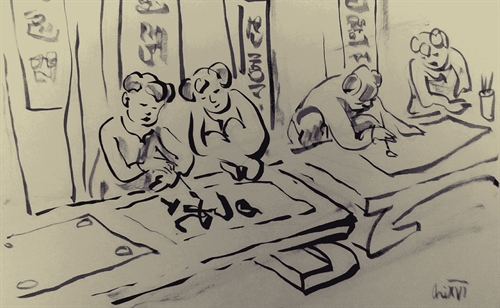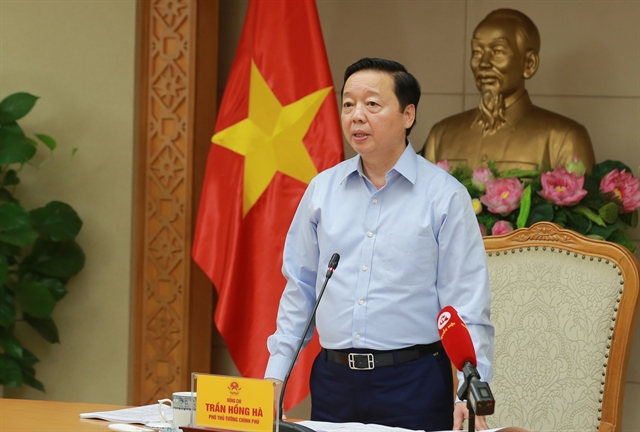 Talk Around Town
Talk Around Town

For thousands of years, Viet Nam’s culture and history was recorded in the Han-Nom scripts, which combine Chinese and Chinese-based Vietnamese characters.
 |
By Thu Hằng
For thousands of years, Viet Nam’s culture and history was recorded in the Han-Nom scripts, which combine Chinese and Chinese-based Vietnamese characters.
For hundreds of years, the number of Vietnamese citizens who can read or write these characters has been dwindling at an exponential pace.
Recently, many academics have proposed that this script is included in school syllabi as part of efforts to preserve our cultural and historical traditions.
At a recent seminar on the role of Han-Nom script in contemporary culture, Dr Đoàn Lê Giang of the Hồ Chí Minh National University said current and future generations would know little about their nation’s history because Viet Nam is among the countries influenced by Chinese culture that has given up using its traditional script.
Students in countries like South Korea, Japan and China are still learning Han characters, but Việt Nam is an exception, he said, adding that Vietnamese citizens should learn and use Han-Nom for preserving the purity of their mother tongue.
Many experts at the seminar shared Giang’s opinion.
It is a good idea to preserve, learn and use the nation’s traditional scripts, but I am uncertain about the merits of introducing it into current school syllabi.
While there is a possibility that the younger generations’ understanding of national history is limited if they cannot read or write in the Han-Nom scripts, does it really have to be so?
Đoàn Khắc Sơn, father of a high school student in Hà Nội, clearly does not think much of the new proposal.
“It would be a great illusion to believe that students who learn Chinese characters in school will be able to read centuries-old documents and understand them clearly.
“How many teachers can teach Han-Nom in our schools? Are we going to hire Chinese teachers to teach our students?”
Another strong disagreement came from Nguyễn Minh Anh, mother of a seventh grade student in the capital city.
“Han-Nom and Roman scripts are two entirely different language systems. The Han characters are very complicated and it will add pressure on children already having to work very hard to learn many things at school.
“Why should we create more pressure for our children? We should teach practical subjects that will help them survive and develop in the future.”
Hanoians of all ages visit the Temple of Literature on Văn Miếu Street on the first day of the Lunar New Year to get small or big scrolls with calligraphic depictions of Han-Nom characters denoting happiness, prosperity, harmony and other attributes.
However most people buying these scrolls cannot read the characters, and do not know what they mean.
“It is true. They just follow their friends in buying them (the scrolls), hoping for luck in the New Year,” said Hoàng Yến, a freelance journalist.
“I agree with the experts that Han-Nom should be taught in schools,” she said.
“As a writer, I think it is really necessary to know Han-Nom because it will help us use the right words.”
Yến said she interviewed many people for the articles she wrote. Many of them, particularly the older ones, are really angry about the way words are used these days.
“According to them, many words are used inappropriately because many people do not understand the original meaning of those words. The Vietnamese language has borrowed many Han words, they stress.”
Nguyễn Tự Trị, 78, loves the Chinese language, which he studied in China more than 55 years ago. He said he was very sad because many Vietnamese people do not understand the meaning of the written words in temples or pagodas that they visit often. They don’t even understand words they use everyday, he said.
“Han-Nom characters are very interesting if people understand them. They will also help us understand more the meanings of words we use everyday,” he said.
He conceded however, that it would be “very difficult to put Han-Nom into the Vietnamese education system at the moment".
“I agree it has to be taught, but we should use it as an optional subject to attract students really interested in learning this language,” he said.
Many people I spoke to felt that there was no need to learn to read or write the Han-Nom scripts. Students and others can be taught the correct meaning of the words, that should do, they said.
We cannot deny the role of Han-Nom characters in the history and the development of the country, because they are the roots of many words in the Vietnamese vocabulary, words very important to the language, then and now.
However, introducing them as a regular part of school curricula is a step we should be very cautious about as we try to compete and survive in a globalised world.
We should not reconnect with the past in ways that could undermine our future. – VNS









